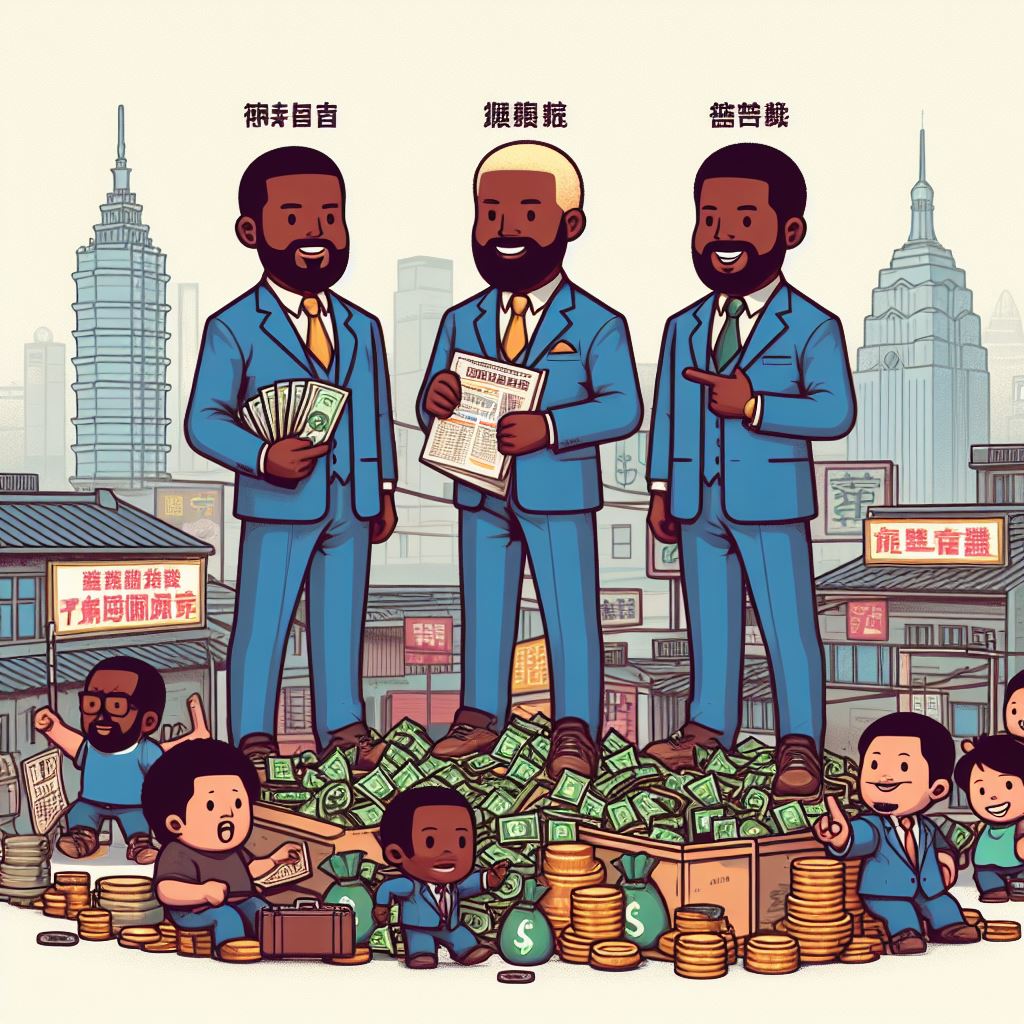類似《華爾街之狼》的金融詐騙案,台灣的「全球統一集團」。
在台灣曾發生過一起類似《華爾街之狼》的金融詐騙案,被稱為史上最大的金融詐騙集團之一的「全球統一集團」。主要涉案人物為楊恭福、楊恭惠和楊恭發三兄弟,他們涉嫌與多家資本額僅幾百萬的公司掛勾,通過包裝垃圾股票來吸引投資者。這些公司聲稱擁有極大潛力,未來將會掛牌上市並獲得巨大利潤,並招募大量員工,讓他們在沒有任何審查的情況下加入公司販售股票。然而,實際上這些公司是以老鼠會的方式運作,引誘員工投資或向親友兜售垃圾股票。
全球統一集團故意混淆自己的名稱與台南的統一集團,這導致部分人掉入陷阱。對外宣稱可以輔導公司上市櫃,甚至展示自製的電子版牆,顯示他們推薦股票的買賣價格,制造出市場活躍的假象。當檢調開始調查時,這些公司卻聲稱是因為支持宋楚瑜而遭到政治迫害。
該公司的員工上班並沒有領到任何薪水,只有賣掉股票才能拿到佣金,類似於老鼠會的方式銷售垃圾股票。主管經常邀請政商名流來演講,鼓吹員工投資以擺脫貧窮,但實際上都是詐騙。
在2004年,楊恭福、楊恭惠、楊恭發三兄弟在官司纏身的情況下,再次成立「世界信息科技股份有限公司」等九家公司,號稱與美國納斯達克上市的網路公司合併,鼓勵員工進行認股。這次詐騙案的受害民眾超過千人以上,非法吸金金額達10億元以上。目前,楊氏三兄弟已在上海重新開業,搖身一變成為幫助中國企業赴美上市的金融機構總裁,似乎過去的黑紀錄對他們沒有造成任何影響。詐騙者使用垃圾股票來欺騙投資者的方法有很多,以下是一些常見的方法:
虛假宣傳:詐騙者會通過虛假廣告、推特帳號或電子郵件向投資者宣傳垃圾股票。這些宣傳可能聲稱該公司即將推出具有革命性技術的新產品,或者有大型交易或合併即將發生,從而誇大該公司的價值,吸引投資者購買股票。
內幕消息:詐騙者聲稱自己有內幕消息,可以提供有關某家公司即將發生的重大事件的信息,如即將發布的好消息、新的產品發布或合併消息。這些內幕消息可能是虛假的,旨在吸引投資者購買股票。
高壓銷售:詐騙者通過高壓銷售技巧,例如給投資者打電話或發送垃圾郵件,強烈推銷股票。他們會施加壓力,強調投資者將錯失一個巨大的機會,如果不立即購買股票。
價格操縱:詐騙者會試圖通過價格操縱手段來推高垃圾股票的價格,從而吸引更多的投資者購買。這可能包括在短時間內大量購買該股票,以創造人為的需求,然後在股價上漲時出售股票以實現利潤。
假冒公司:詐騙者會創建假冒公司,並發布虛假的財務報告或其他信息,試圖使這些公司看起來像是有價值的投資機會。然後,他們可能會將這些股票推銷給投資者,從而欺騙他們購買價值較低或完全沒有價值的股票。
這些都是詐騙者常用的手法,目的是誘使投資者購買垃圾股票,從而使他們獲取利潤。投資者應該保持警惕,對來自未知來源的股票推薦持懷疑態度,並進行足夠的研究和盡職調查,以確保他們做出明智的投資決策。會掉入這些陷阱主要是人的貪念,如果真的有這麼好的投資機會怎可能會讓散戶投資?
There was a financial fraud case in Taiwan, similar to "The Wolf of Wall Street," called the "Global Uni-President Group," considered one of the largest financial fraud groups in history. The main suspects were the three brothers Yang Gongfu, Yang Gonghui, and Yang Gongfa. They were suspected of collaborating with several companies with capital of only a few million, packaging junk stocks to attract investors. These companies claimed to have great potential, promising to list on the stock market in the future and make huge profits. They recruited a large number of employees, allowing them to join the company and sell stocks without any scrutiny. However, these companies actually operated as Ponzi schemes, luring employees to invest or sell junk stocks to friends and family.
The Global Uni-President Group intentionally confused its name with the Uni-President Group in Tainan, causing some people to fall into the trap. They claimed to be able to guide companies to list on the stock market, even displaying self-made electronic boards showing the buying and selling prices of recommended stocks to create the illusion of a vibrant market. When the authorities began investigating, these companies claimed they were politically persecuted for supporting James Soong.
Employees of the company did not receive any salaries but earned commissions only by selling stocks, similar to how Ponzi schemes operate. Executives often invited political and business celebrities to give speeches, urging employees to invest to escape poverty, but it was all a scam.
In 2004, when the Yang brothers were involved in legal troubles, they once again established nine companies, including the "World Information Technology Co., Ltd.," claiming to merge with a US Nasdaq-listed Internet company, and encouraged employees to subscribe to shares. The number of victims in this fraud case exceeded one thousand, with illegal funds exceeding 1 billion NT dollars. Currently, the Yang brothers have reopened their business in Shanghai, transforming into CEOs of financial institutions helping Chinese companies list in the US, seemingly unaffected by their past black records.
Scammers use various methods to deceive investors with junk stocks, some of which include:
False advertising: Promoting junk stocks through false advertisements, Twitter accounts, or emails to investors. These promotions may claim that the company is about to launch a revolutionary new product or that a large transaction or merger is imminent, exaggerating the company's value to attract investors.
Insider information: Claiming to have insider information about significant events about to happen to a company, such as upcoming good news, new product releases, or merger news. This insider information may be false, aimed at enticing investors to buy stocks.
High-pressure sales: Using high-pressure sales techniques, such as calling investors or sending junk emails, to aggressively promote stocks. They apply pressure, emphasizing that investors will miss out on a massive opportunity if they don't buy stocks immediately.
Price manipulation: Attempting to push up the price of junk stocks through price manipulation, thereby attracting more investors to buy. This may include buying a large number of stocks in a short period to create artificial demand, then selling stocks when the price rises to make a profit.
Fake companies: Creating fake companies and releasing false financial reports or other information to make these companies appear to be valuable investment opportunities. They may then sell these stocks to investors, deceiving them into buying stocks of lower value or no value at all.
These are some of the common methods used by scammers to induce investors to buy junk stocks, aiming to profit themselves. Investors should remain vigilant, be skeptical of stock recommendations from unknown sources, and conduct sufficient research and due diligence to ensure they make wise investment decisions. Falling into these traps mainly stems from greed. If there were genuinely excellent investment opportunities, how could they possibly let individual investors in on them?




照片:DALLE3
- 1
- 2
- 3
- 4
